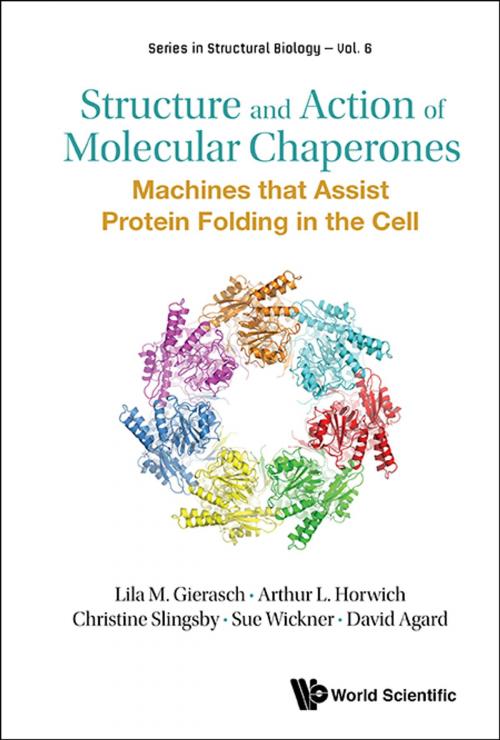Structure and Action of Molecular Chaperones
Machines that Assist Protein Folding in the Cell
Nonfiction, Science & Nature, Science, Biological Sciences, Cytology, Other Sciences, Molecular Biology| Author: | Lila M Gierasch, Arthur L Horwich, Christine Slingsby;Sue Wickner;David Agard | ISBN: | 9789814749343 |
| Publisher: | World Scientific Publishing Company | Publication: | August 8, 2016 |
| Imprint: | WSPC | Language: | English |
| Author: | Lila M Gierasch, Arthur L Horwich, Christine Slingsby;Sue Wickner;David Agard |
| ISBN: | 9789814749343 |
| Publisher: | World Scientific Publishing Company |
| Publication: | August 8, 2016 |
| Imprint: | WSPC |
| Language: | English |
This unique volume reviews the beautiful architectures and varying mechanical actions of the set of specialized cellular proteins called molecular chaperones, which provide essential kinetic assistance to processes of protein folding and unfolding in the cell. Ranging from multisubunit ring-shaped chaperonin and Hsp100 machines that use their central cavities to bind and compartmentalize action on proteins, to machines that use other topologies of recognition — binding cellular proteins in an archway or at the surface of a "clamp" or at the surface of a globular assembly — the structures show us the ways and means the cell has devised to assist its major effectors, proteins, to reach and maintain their unique active forms, as well as, when required, to disrupt protein structure in order to remodel or degrade. Each type of chaperone is beautifully illustrated by X-ray and EM structure determinations at near- atomic level resolution and described by a leader in the study of the respective family. The beauty of what Mother Nature has devised to accomplish essential assisting actions for proteins in vivo is fully appreciable.
Contents:
- Hsp70 Molecular Chaperones: Versatile Modular Nanomachines that Mediate Multiple Biological Functions (Lila M Gierasch)
- Structural Analysis of GroEL/GroES Chaperone-Mediated Protein Folding (Arthur L Howrich)
- Structural Analysis of Type II Chaperonins in Archaebacteria and the Eukaryotic Cytosol (Arthur L Howrich)
- The Family of Small Heat Shock Proteins: Assembly and Binding Functions (C Slingsby and A R Clark)
- Structure and Mechanism of AAA+ Chaperones (Shannon M Doyle, Andrea N Kravats and Sue Wickner)
- Structural Insights into Hsp90 Function (Elaine Kirschke, Daniel Elnatan, Kliment Verba and David A Agard)
Readership: Cell and molecular biologists, biochemists and biophysicists, nanoscientists.
This unique volume reviews the beautiful architectures and varying mechanical actions of the set of specialized cellular proteins called molecular chaperones, which provide essential kinetic assistance to processes of protein folding and unfolding in the cell. Ranging from multisubunit ring-shaped chaperonin and Hsp100 machines that use their central cavities to bind and compartmentalize action on proteins, to machines that use other topologies of recognition — binding cellular proteins in an archway or at the surface of a "clamp" or at the surface of a globular assembly — the structures show us the ways and means the cell has devised to assist its major effectors, proteins, to reach and maintain their unique active forms, as well as, when required, to disrupt protein structure in order to remodel or degrade. Each type of chaperone is beautifully illustrated by X-ray and EM structure determinations at near- atomic level resolution and described by a leader in the study of the respective family. The beauty of what Mother Nature has devised to accomplish essential assisting actions for proteins in vivo is fully appreciable.
Contents:
- Hsp70 Molecular Chaperones: Versatile Modular Nanomachines that Mediate Multiple Biological Functions (Lila M Gierasch)
- Structural Analysis of GroEL/GroES Chaperone-Mediated Protein Folding (Arthur L Howrich)
- Structural Analysis of Type II Chaperonins in Archaebacteria and the Eukaryotic Cytosol (Arthur L Howrich)
- The Family of Small Heat Shock Proteins: Assembly and Binding Functions (C Slingsby and A R Clark)
- Structure and Mechanism of AAA+ Chaperones (Shannon M Doyle, Andrea N Kravats and Sue Wickner)
- Structural Insights into Hsp90 Function (Elaine Kirschke, Daniel Elnatan, Kliment Verba and David A Agard)
Readership: Cell and molecular biologists, biochemists and biophysicists, nanoscientists.















